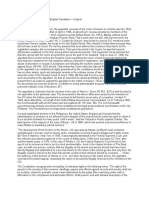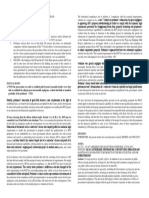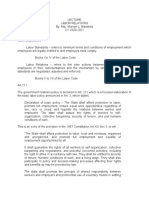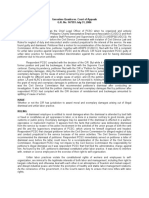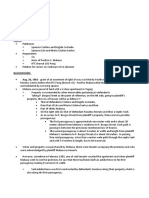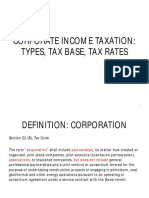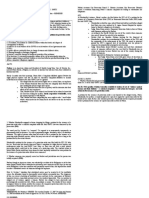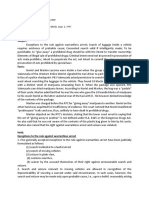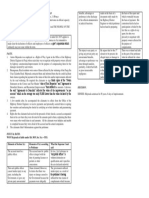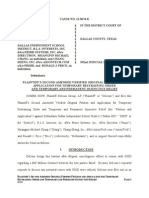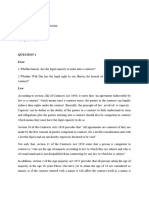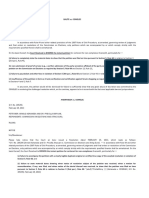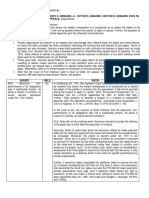1 Tano vs. Socrates
1 Tano vs. Socrates
Uploaded by
doraemoanCopyright:
Available Formats
1 Tano vs. Socrates
1 Tano vs. Socrates
Uploaded by
doraemoanOriginal Description:
Copyright
Available Formats
Share this document
Did you find this document useful?
Is this content inappropriate?
Copyright:
Available Formats
1 Tano vs. Socrates
1 Tano vs. Socrates
Uploaded by
doraemoanCopyright:
Available Formats
154 SUPREME COURT REPORTS ANNOTATED
Tano vs. Socrates
*
G.R. No. 110249. August 21, 1997.
ALFREDO TANO, BALDOMERO TANO, DANILO TANO,
ROMUALDO TANO, TEOCENES MIDELLO, ANGEL DE
MESA, EULOGIO TREMOCHA, FELIPE ONGONION,
JR., ANDRES LINIJAN, ROBERT LIM, VIRGINIA LIM,
FELIMON DE MESA, GENEROSO ARAGON,
TEODORICO ANDRE, ROMULO DEL ROSARIO,
CHOLITO ANDRE, ERICK MONTANO, ANDRES OLIVA,
VITTORIO SALVADOR, LEOPOLDO ARAGON, RAFAEL
RIBA, ALEJANDRO LEONILA, JOSE DAMACINTO,
RAMIRO MANAEG, RUBEN MARGATE, ROBERTO
REYES, DANILO PANGARUTAN, NOE GOLPAN,
ESTANISLAO ROMERO, NICANOR DOMINGO,
ROLDAN TABANG, ADRIANO TABANG, FREDDIE
SACAMAY, MIGUEL TRIMOCHA, PACENCIO LABABIT,
PABLO H. OMPAD, CELESTINO A. ABANO, ALLAN
ALMODAL, BILLY D. BARTOLAY, ALBINO D. LIQUE,
MELCHOR J. LAYSON, MELANIE AMANTE, CLARO E.
YATOC, MERGELDO B. BALDEO, EDGAR M.
ALMASETA, JOSELITO MANAEG, LIBERATO
ANDRADA, JR., ROBERTO BERRY, RONALD
VILLANUEVA, EDUARDO VALMORIA, WILFREDO
MENDOZA, NAPOLEON BABANGGA, ROBERTO
TADEPA, RUBEN ASINGUA, SILVERIO GABO, JERRY
ROMERO, DAVID PANGGARUTAN, DANIEL
PANGGARUTAN, ROMEO AGAWIN, FERNANDO
EQUIZ, DITO LEQUIZ, RONILO MODERABLE,
BENEDICTO TORRES, ROSITO A. VALDEZ,
CRESENCIO A. SAYANG, NICOMEDES S. ACOSTA,
ERENEO A. SEGARINO, JR., WILFREDO A. RAUTO,
DIOSDADO A. ACOSTA, BONIFACIO G. SISMO, TACIO
ALUBA, DANIEL B. BATERZAL, ELISEO YBAÑEZ,
DIOSDADO E. HANCHIC, EDDIE ESCALICAS,
ELEAZAR B. BATERZAL, DOMINADOR HALICHIC,
ROOSEVELT RISMOAN, ROBERT C. MERCADER,
TIRSO ARESGADO, DANIEL CHAVEZ, DANILO
CHAVEZ, VICTOR VILLAROEL, ERNESTO C. YBAÑEZ,
ARMANDO T. SANTILLAN,
__________________
* EN BANC.
155
VOL. 278, AUGUST 21, 1997 155
Tano vs. Socrates
RUDY S. SANTILLAN, JODJEN ILUSTRISIMO, NESTOR
SALANGRON, ALBERTO SALANGRON, ROGER L.
ROXAS, FRANCISCO T. ANTICANO, PASTOR
SALANGRON, BIENVENIDO SANTILLAN, GILBUENA
LADDY, FIDEL BENJAMIN, JOVELITO BELGANO,
HONEY PARIOL, ANTONIO SALANGRON, NICASIO
SALANGRON, & AIRLINE SHIPPERS ASSOCIATION OF
PALAWAN, petitioners, vs. HON. GOV. SALVADOR P.
SOCRATES, MEMBERS OF SANGGUNIANG
PANLALAWIGAN OF PALAWAN, namely, VICE
GOVERNOR JOEL T. REYES, JOSE D. ZABALA,
ROSALINO R. ACOSTA, JOSELITO A. CADLAON,
ANDRES R. BAACO, NELSON P. PENEYRA, CIPRIANO
C. BARROMA, CLARO E. ORDINARIO, ERNESTO A.
LLACUNA, RODOLFO C. FLORDELIZA, GILBERT S.
BAACO, WINSTON G. ARZAGA, NAPOLEON F.
ORDONEZ and GIL P. ACOSTA, CITY MAYOR EDWARD
HAGEDORN, MEMBERS OF SANGGUNIANG
PANLUNGSOD NG PUERTO PRINCESA, ALL
MEMBERS OF BANTAY DAGAT, MEMBERS OF
PHILIPPINE NATIONAL POLICE OF PALAWAN,
PROVINCIAL AND CITY PROSECUTORS OF PALAWAN
and PUERTO PRINCESA CITY, and ALL JUDGES OF
PALAWAN, REGIONAL, MUNICIPAL AND
METROPOLITAN, respondents.
Remedial Law; Special Civil Action; Certiorari; The general
rule is that where a motion to quash is denied, the remedy
therefrom is not certiorari, but for the party aggrieved thereby to go
to trial without prejudice to reiterating special defenses involved in
said motion, and if, after trial on the merits an adverse decision is
rendered, to appeal therefrom in the manner authorized by law.—
As to the first set of petitioners, this special civil for certiorari
must fail on the ground of prematurity amounting to a lack of
cause of action. There is no showing that said petitioners, as the
accused in the criminal cases, have filed motions to quash the
informations therein and that the same were denied. The ground
available for such motions is that the facts charged therein do not
constitute an offense because the ordinances in question are
unconstitutional. It cannot then be said that the lower courts
acted without or in excess of jurisdiction or with grave abuse of
discretion to justify recourse to the extraordinary remedy of
certiorari or prohibition. It must further be
156
156 SUPREME COURT REPORTS ANNOTATED
Tano vs. Socrates
stressed that even if petitioners did file motions to quash, the
denial thereof would not forthwith give rise to a cause of action
under Rule 65 of the Rules of Court. The general rule is that
where a motion to quash is denied, the remedy therefrom is not
certiorari, but for the party aggrieved thereby to go to trial
without prejudice to reiterating special defenses involved in said
motion, and if, after trial on the merits an adverse decision is
rendered, to appeal therefrom in the manner authorized by law.
And, even where in an exceptional circumstance such denial may
be the subject of a special civil action for certiorari, a motion for
reconsideration must have to be filed to allow the court concerned
an opportunity to correct its errors, unless such motion may be
dispensed with because of existing exceptional circumstances.
Finally, even if a motion for reconsideration has been filed and
denied, the remedy under Rule 65 is still unavailable absent any
showing of the grounds provided for in Section 1 thereof. For
obvious reasons, the petition at bar does not, and could not have,
alleged any of such grounds.
Same; Same; Same; While the Court has concurrent
jurisdiction with Regional Trial Courts and with the Court of
Appeals to issue writs of certiorari, prohibition, mandamus, quo
warranto, habeas corpus and injunction, such concurrence gives
petitioners no unrestricted freedom of choice of court forum.—Even
granting arguendo that the first set of petitioners have a cause of
action ripe for the extraordinary writ of certiorari, there is here a
clear disregard of the hierarchy of courts, and no special and
important reason or exceptional and compelling circumstance has
been adduced why direct recourse to us should be allowed. While
we have concurrent jurisdiction with Regional Trial courts and
with the Court of Appeals to issue writs of certiorari, prohibition,
mandamus, quo warranto, habeas corpus and injunction, such
concurrence gives petitioners no unrestricted freedom of choice of
court forum.
Same; Same; Same; The judicial policy that the Court will not
entertain direct resort to it unless the redress desired cannot be
obtained in the appropriate courts or where exceptional and
compelling circumstances justify availment of a remedy within
and calling for the exercise of a primary jurisdiction.—In Santiago
v. Vasquez, this Court forcefully expressed that the propensity of
litigants and lawyers to disregard the hierarchy of courts must be
put to a halt, not only because of the imposition upon the precious
time of this Court, but also because of the inevitable and resultant
delay, intended or otherwise, in the adjudication of the case which
often has to be
157
VOL. 278, AUGUST 21, 1997 157
Tano vs. Socrates
remanded or referred to the lower court, the proper forum under
the rules of procedure, or as better equipped to resolve the issues
since this Court is not a trier of facts. We reiterated “the judicial
policy that this Court will not entertain direct resort to it unless
the redress desired cannot be obtained in the appropriate courts
or where exceptional and compelling circumstances justify
availment of a remedy within and calling for the exercise of [its]
primary jurisdiction.”
Same; Same; Declaratory Relief; Supreme Court is not
possessed of original jurisdiction over petitions for declaratory
relief even if only questions of law are involved.—As to the second
set of petitioners, the instant petition is obviously one for
DECLARATORY RELIEF, i.e., for a declaration that the
Ordinances in question are a “nullity. . . for being
unconstitutional.” As such, their petition must likewise fail, as
this Court is not possessed of original jurisdiction over petitions
for declaratory relief even if only questions of law are involved, it
being settled that the Court merely exercises appellate
jurisdiction over such petitions.
Constitutional Law; Statute; Statutory Construction; It is
settled that laws (including ordinances enacted by local
government units) enjoy the presumption of constitutionality.—It
is of course settled that laws (including ordinances enacted by
local government units) enjoy the presumption of
constitutionality. To overthrow this presumption, there must be a
clear and unequivocal breach of the Constitution, not merely a
doubtful or argumentative contradiction. In short, the conflict
with the Constitution must be shown beyond reasonable doubt.
Where doubt exists, even if wellfounded, there can be no finding
of unconstitutionality. To doubt is to sustain.
Same; Same; Same; Court finds petitioners’ contentions
baseless and holds that the Ordinances do not suffer from any
infirmity both under the Constitution and applicable laws.—After
a scrutiny of the challenged Ordinances and the provisions of the
Constitution petitioners claim to have been violated, we find
petitioners’ contentions baseless and so hold that the former do
not suffer from any infirmity, both under the Constitution and
applicable laws.
MENDOZA, J., Concurring Opinion:
Municipal Corporations; Local Government Code; Statutes;
The ordinances in question are police power measures, enacted by
the
158
158 SUPREME COURT REPORTS ANNOTATED
Tano vs. Socrates
Province of Palawan and the City of Puerto Princesa, pursuant to
the Local Government Code of 1991.—The ordinances in question
are police power measures, enacted by the Province of Palawan
and the City of Puerto Princesa, pursuant to the Local
Government Code of 1991 which makes it in fact their duty to
enact measures to “protect the environment and impose
appropriate penalties for acts which endanger the environment,
such as dynamite fishing and other forms of destructive fishing. . .
.” There is no basis for the claim in the dissenting opinion that the
subject of these ordinances lies within the competence of the
national government. For the matter concerns a local problem,
namely, the destruction of aquatic resources in the Province of
Palawan.
Same; Same; Same; The presumption of constitutionality must
prevail in the absence of some factual foundation of record for
overthrowing the statute.—It has been held that “as underlying
questions of fact may condition the constitutionality of legislation
of this character, the presumption of constitutionality must
prevail in the absence of some factual foundation of record for
overthrowing the statute.” No evidence has been presented by
petitioners to overthrow the factual basis of the ordinances—that,
as a result of the use of cyanide and other noxious substances for
fishing, only 5% of the coral reefs in Palawan was in excellent
condition, that 75% had been heavily destroyed, and that because
of the thriving market for live fish and lobster here and abroad
there was rampant illicit trade in live fish.
Same; Same; Same; If the laws passed are seen to have a
reasonable relation to a proper legislative purpose, and are neither
arbitrary nor discriminatory, the requirements of due process are
satisfied, and judicial determination to that effect renders a court
functus officio.—Nor has it been shown by petitioners that the
local legislation here involved is arbitrary or unreasonable. It has
been held: “If the laws passed are seen to have a reasonable
relation to a proper legislative purpose, and are neither arbitrary
nor discriminatory, the requirements of due process are satisfied,
and judicial determination to that effect renders a court functus
officio. . . . With the wisdom of the policy adopted, with the
adequacy or practicability of the law enacted to forward it, the
courts are both incompetent and unauthorized to deal. . . .”
159
VOL. 278, AUGUST 21, 1997 159
Tano vs. Socrates
BELLOSILLO, J., Dissenting Opinion:
Statutes; Statutory Construction; Municipal Ordinances;
Wellestablished tests of a valid ordinance.—In Magtajas v. Pryce
Properties Corporation, we reiterated that the wellestablished
tests of a valid ordinance are: (a) It must not contravene the
Constitution or any statute; (b) It must not be unfair or
oppressive; (c) It must not be partial or discriminatory; (d) It must
not prohibit but may regulate trade; (e) It must be general and
consistent with public policy; and, (f) It must not be unreasonable.
Same; Same; Same; Special law should prevail over the
general law.—Further, while the Local Government Code is a
general law on the powers, responsibilities and composition of
different local government units, P.D. No. 704 is a special law
dealing with the protection and conservation of fishing and
aquatic resources including those in the municipal waters. Hence,
the special law should prevail over the general law.
Same; Same; Same; P.D. No. 704 imposes a mandatory
requirement directing municipal or city governments to submit
ordinances enacted pertinent to fishing and fishery resources to the
Secretary of Agriculture.—There is no doubt that under P.D. No.
704 fishing, fishery and aquatic resources in municipal waters are
under the jurisdiction of the municipal or city government
concerned. However, the same decree imposes a mandatory
requirement directing municipal or city governments to submit
ordinances enacted pertinent to fishing and fishery resources to
the Secretary of Agriculture who now has control and supervision
over the Bureau of Fisheries and Aquatic Resources (BFAR). The
ordinances will attain full force and effect only upon the approval
of the Secretary of Agriculture.
Same; Same; Same; Admittedly, Ordinance 1592 of Puerto
Princesa City was not submitted to the Secretary of Agriculture
through the BFAR for approval.—Ordinance 1592 of Puerto
Princesa City, admittedly, was not submitted to the Secretary of
Agriculture through the BFAR for approval. Such failure of
compliance with the law prevented it from becoming valid and
effective. Consequently, Office Order No. 23 of the Mayor of
Puerto Princesa City which seeks to implement and enforce
Ordinance No. 1592 is also ineffective as there is nothing to
implement.
160
160 SUPREME COURT REPORTS ANNOTATED
Tano vs. Socrates
Same; Same; Police Power; In order that a local government
may exercise police power, there must be a legislative grant which
necessarily sets the limits for the exercise of the power.—It is true
that police power can be exercised through the general welfare
clause. But, while police power is inherent in a state, it is not so
in municipal corporations or local governments. In order that a
local government may exercise police power, there must be a
legislative grant which necessarily sets the limits for the exercise
of the power. In this case, Congress has enacted the Local
Government Code which provides the standards as well as the
limitations in the exercise of the police power by the local
government unit.
Same; Municipal Ordinances; While a local government unit
may adopt ordinances upon subjects covered by law or statute,
such ordinances should be in accordance with and not repugnant
to the law.—The power devolved upon the municipality under the
Local Government Code is the enforcement of existing fishery
laws of the State and not the enactment thereof. While a local
government unit may adopt ordinances upon subjects covered by
law or statute, such ordinances should be in accordance with and
not repugnant to the law. In view thereof, ordinances which may
be enacted by the municipality or city should be pursuant to the
provisions of P.D. Nos. 704, 1015 and 1219. Thus, under the
provisions of Secs. 447, par. 1 (vi), 458, par. 1 (vi) and 468, par. 1
(vi), the municipality, city and province respectively may approve
ordinances protecting the environment by specifically penalizing
only those acts which endanger the environment such as
dynamite fishing and other forms of destructive fishing which are
already prohibited under P.D. Nos. 704 and 1219, and other laws
on illegal fishing.
Same; Same; The questioned ordinances may also be struck
down for being not only a prohibitory legislation but also an
unauthorized exercise of delegation of powers.—The questioned
ordinances may also be struck down for being not only a
prohibitory legislation but also an unauthorized exercise of
delegation of powers. An objective, however worthy or desirable it
may be, such as the protection and conservation of our fisheries in
this case, can be attained by a measure that does not encompass
too wide a field. The purpose can be achieved by reasonable
restrictions rather than by absolute prohibition. Local
governments are not possessed with prohibitory powers but only
regulatory powers under the general welfare clause. They cannot
therefore exceed the powers granted to them by the Code by
altogether prohibiting fishing and selling for five (5) years
161
VOL. 278, AUGUST 21, 1997 161
Tano vs. Socrates
all live fishes through Ordinance No. 1592 and coral organisms
through Ordinance No. 293 involving even lawful methods of
fishing.
SPECIAL CIVIL ACTION in the Supreme Court.
Certiorari and Prohibition.
The facts are stated in the opinion of the Court.
Arturo S. Santos for petitioners.
Agustin M. Rocamora for Edward S. Hagedorn,
Sanggunian Panlungsod of Puerto Princesa City and
Bantay Dagat of Puerto Princesa City.
Romeo M. Seratubas, Robert Y. Peneyra and Martin
E. Ruelo for Salvador P. Socrates.
DAVIDE, JR., J.:
Petitioners caption their petition as one for “Certiorari,
Injunction With Preliminary and Mandatory Injunction,
with Prayer for Temporary Restraining Order” and pray
that this Court: (1) declare as unconstitutional: (a)
Ordinance No. 1592, dated 15 December 1992, of the
Sangguniang Panlungsod of Puerto Princesa; (b) Office
Order No. 23, Series of 1993, dated 22 January 1993,
issued by Acting City Mayor Amado L. Lucero of Puerto
Princesa City; and (c) Resolution No. 33, Ordinance No. 2,
Series of 1993, dated 19 February 1993, of the
Sangguniang Panlalawigan of Palawan; (2) enjoin the
enforcement thereof; and (3) restrain respondents
Provincial and City Prosecutors of Palawan and Puerto
Princesa City and Judges 1 of the Regional Trial Courts,
Metropolitan Trial Courts and Municipal Circuit Trial
Courts in Palawan from assuming jurisdiction over and
hearing cases concerning the violation of the Ordinances
and of the Office Order.
More appropriately, the petition is, and shall be treated
as, a special civil action for certiorari and prohibition.
_________________
1 None, however, exists in Puerto Princesa City.
162
You might also like
- Donald J. Trump For President, Et Al.Document28 pagesDonald J. Trump For President, Et Al.Hannah M100% (3)
- Xavier Case Brief TemplateDocument4 pagesXavier Case Brief TemplateJay-r RbarNo ratings yet
- 7 - Panay Railways v. Heva - General PrinciplesDocument3 pages7 - Panay Railways v. Heva - General PrinciplesJosh PalomeraNo ratings yet
- Moncado Vs People's Court - English Translation - OriginalDocument4 pagesMoncado Vs People's Court - English Translation - OriginalNJPMsmash0% (1)
- 7 Alvarez v. PeopleDocument1 page7 Alvarez v. PeopledoraemoanNo ratings yet
- Anguluan Vs TagubaDocument3 pagesAnguluan Vs TagubanchlrysNo ratings yet
- People of The Philippines v. Arrojado (774 SCRA 193, 2015)Document2 pagesPeople of The Philippines v. Arrojado (774 SCRA 193, 2015)Earvin James Atienza100% (1)
- Gonzales Vs NLRCDocument1 pageGonzales Vs NLRCKatrina BudlongNo ratings yet
- Lecture Labor 091520Document13 pagesLecture Labor 091520Ana Carmela DomingoNo ratings yet
- Perez v. Provincial BoardDocument2 pagesPerez v. Provincial BoardJoshua LanzonNo ratings yet
- CD - 91. Zuo v. CabredoDocument2 pagesCD - 91. Zuo v. CabredoCzarina Cid100% (1)
- 10 Quadra Vs CADocument1 page10 Quadra Vs CAChristiane Marie Bajada0% (1)
- Appendix Petition For Involuntary Commitment For A Child Who A Repeat OffenderDocument2 pagesAppendix Petition For Involuntary Commitment For A Child Who A Repeat OffenderMa. Teresa LautNo ratings yet
- Lawyers Duties in Handling Clients Case CompleteDocument23 pagesLawyers Duties in Handling Clients Case CompleteAnne Lorraine DioknoNo ratings yet
- 6-People Vs Bautista (1996)Document7 pages6-People Vs Bautista (1996)Abigail DeeNo ratings yet
- 106 SCRA 591 - Legal Ethics - Gross Immoral Conduct: ISSUE: Whether or Not ManiwangDocument3 pages106 SCRA 591 - Legal Ethics - Gross Immoral Conduct: ISSUE: Whether or Not ManiwangHarold ApostolNo ratings yet
- Labor 2 Finals Ful CasesDocument238 pagesLabor 2 Finals Ful CasesEmmaNo ratings yet
- Rule 40-56 Springfield v. RTCDocument3 pagesRule 40-56 Springfield v. RTCTheodore0176No ratings yet
- Lao V Mabutin - MiguelDocument3 pagesLao V Mabutin - MiguelVianca MiguelNo ratings yet
- People v. MTCDocument1 pagePeople v. MTCrejNo ratings yet
- People-V-EstebiaDocument1 pagePeople-V-EstebiaRhea CalabinesNo ratings yet
- Beltran V People GR 175013 June 1 2007Document99 pagesBeltran V People GR 175013 June 1 2007JP DCNo ratings yet
- Pampanga Sugar Development Company Vs NLRCDocument3 pagesPampanga Sugar Development Company Vs NLRCRoss Camille SalazarNo ratings yet
- Collector of CustomsDocument2 pagesCollector of CustomsElla QuiNo ratings yet
- Custodio v. CADocument3 pagesCustodio v. CAdelayinggratificationNo ratings yet
- 1 Salazar Vs Achacoso PDF FreeDocument1 page1 Salazar Vs Achacoso PDF FreeKeyan MotolNo ratings yet
- Last Minute Tips For Remedial Law Review FinalsDocument2 pagesLast Minute Tips For Remedial Law Review Finalsmercy rodriguezNo ratings yet
- Manzanaris Vs PeopleDocument3 pagesManzanaris Vs PeopleJuan DoeNo ratings yet
- Case Guide - Rule 114 (Bail)Document3 pagesCase Guide - Rule 114 (Bail)Christopher Martin GunsatNo ratings yet
- Crim Procedures Cases For Rule 124 and 125Document28 pagesCrim Procedures Cases For Rule 124 and 125Ellen Glae DaquipilNo ratings yet
- Legal Research On The Imprescriptibility of The Torrens TitleDocument2 pagesLegal Research On The Imprescriptibility of The Torrens Titlenoorlaw0% (1)
- Civ Pro CasesDocument15 pagesCiv Pro CasesNelsonPolinarLaurdenNo ratings yet
- De Guzman Vs PP DigestDocument2 pagesDe Guzman Vs PP DigestLim JacquelineNo ratings yet
- PP vs. Rosare - Case DigestDocument2 pagesPP vs. Rosare - Case DigestJP De La PeñaNo ratings yet
- Ouano Vs Ca Case DigestDocument1 pageOuano Vs Ca Case DigestNadine Reyna CantosNo ratings yet
- Diagnostics in Legal Ethics. 2020. Q and ADocument5 pagesDiagnostics in Legal Ethics. 2020. Q and AColleen Rose GuanteroNo ratings yet
- The Judicial DepartmentDocument9 pagesThe Judicial Departmentuvwevewvwvevwve ossasNo ratings yet
- Radio Communications vs. Santiago Digest (Administrative Law) : FactsDocument6 pagesRadio Communications vs. Santiago Digest (Administrative Law) : FactsrolxtootxNo ratings yet
- Researches Reply BriefDocument278 pagesResearches Reply BriefNyl AnerNo ratings yet
- 1 Cals Poultry Supply Corporation and Danilo YapDocument4 pages1 Cals Poultry Supply Corporation and Danilo Yapmichelle m. templadoNo ratings yet
- Concrete Aggregates v. CADocument1 pageConcrete Aggregates v. CASerneiv YrrejNo ratings yet
- Guerrero V CA (GR L-44570)Document5 pagesGuerrero V CA (GR L-44570)Rogie ToriagaNo ratings yet
- People Vs MamarilDocument2 pagesPeople Vs MamarilLloyd David P. VicedoNo ratings yet
- Reodica vs. CADocument14 pagesReodica vs. CAShiela BrownNo ratings yet
- Siquian Vs ComelecDocument2 pagesSiquian Vs ComelecAthena SantosNo ratings yet
- Lacurom V Judge Tienzo DigestDocument3 pagesLacurom V Judge Tienzo DigestJermone MuaripNo ratings yet
- BOHOL vs. CA: Petitioner: Respondent: DATE: December 28, 1995 PONENTE: Decembeer 28, 1995, JDocument2 pagesBOHOL vs. CA: Petitioner: Respondent: DATE: December 28, 1995 PONENTE: Decembeer 28, 1995, JLance MorilloNo ratings yet
- 2.) Summary Tan-Andal Vs AndalDocument8 pages2.) Summary Tan-Andal Vs AndalJarvin David ResusNo ratings yet
- Estolas Vs Mabalot, 381 SCRA 702Document1 pageEstolas Vs Mabalot, 381 SCRA 702Leonard GarciaNo ratings yet
- Asia Banking Corp V Lichauco Case DigestDocument2 pagesAsia Banking Corp V Lichauco Case DigestedrearamirezNo ratings yet
- Assignment 1 With Answers Finished NaDocument5 pagesAssignment 1 With Answers Finished NaNacfNo ratings yet
- 17navaroo v. CSC 226 Scra 522Document1 page17navaroo v. CSC 226 Scra 522Deanne Mitzi SomolloNo ratings yet
- Perlas de Rossi vs. NLRCDocument1 pagePerlas de Rossi vs. NLRCAllenNo ratings yet
- Golden DonutsDocument1 pageGolden DonutsMavic MoralesNo ratings yet
- Group 1 Chiong Vs BaloloyDocument2 pagesGroup 1 Chiong Vs BaloloyJuan Miguel San Pedro100% (1)
- CrimproDocument18 pagesCrimproMekiNo ratings yet
- Lapu Lapu Development Vs Group ManagementDocument6 pagesLapu Lapu Development Vs Group ManagementKenmar NoganNo ratings yet
- De Chavez V OmbudsmanDocument4 pagesDe Chavez V OmbudsmanJincy Biason MonasterialNo ratings yet
- People of The Philippines Antonio AquinoDocument2 pagesPeople of The Philippines Antonio AquinoGrey Gap TVNo ratings yet
- Labor Stds.Document9 pagesLabor Stds.anna beeNo ratings yet
- 08 Tano v. SocratesDocument39 pages08 Tano v. SocratesmaybeNo ratings yet
- 278 Scra 154-Tano Vs SocratesDocument67 pages278 Scra 154-Tano Vs Socratesracaliguiranco100% (1)
- 3 Tagaytay Highlands International Golf Club Incorporated vs. Tagaytay Highlands Employees Union PTGWO PDFDocument15 pages3 Tagaytay Highlands International Golf Club Incorporated vs. Tagaytay Highlands Employees Union PTGWO PDFdoraemoanNo ratings yet
- Be It Enacted by The Senate and House of Representatives of The Philippines in Congress AssembledDocument14 pagesBe It Enacted by The Senate and House of Representatives of The Philippines in Congress AssembleddoraemoanNo ratings yet
- Obligations Case DigestDocument20 pagesObligations Case DigestdoraemoanNo ratings yet
- Ignacio Barzaga, Petitioner, V. Court of Appeals and ANGELITO ALVIAR, Respondents. Bellosillo, J.Document7 pagesIgnacio Barzaga, Petitioner, V. Court of Appeals and ANGELITO ALVIAR, Respondents. Bellosillo, J.doraemoanNo ratings yet
- SPL Digest 4Document13 pagesSPL Digest 4doraemoanNo ratings yet
- 1 4DS - CORPORATE INCOME TAXATION - Pptx.mvav280517 PDFDocument46 pages1 4DS - CORPORATE INCOME TAXATION - Pptx.mvav280517 PDFdoraemoan100% (1)
- CacayorinDocument9 pagesCacayorindoraemoanNo ratings yet
- People V GalugaDocument9 pagesPeople V GalugadoraemoanNo ratings yet
- Petitioner vs. vs. Respondent: First DivisionDocument8 pagesPetitioner vs. vs. Respondent: First DivisiondoraemoanNo ratings yet
- Petitioners Vs Vs Respondents: en BancDocument8 pagesPetitioners Vs Vs Respondents: en BancdoraemoanNo ratings yet
- Petitioner vs. vs. Respondent.: Second DivisionDocument10 pagesPetitioner vs. vs. Respondent.: Second DivisiondoraemoanNo ratings yet
- 16 Pavlow v. MendenillaDocument2 pages16 Pavlow v. Mendenilladoraemoan100% (1)
- Piracy Laws Comparison TableDocument1 pagePiracy Laws Comparison TabledoraemoanNo ratings yet
- Ol Gen Calida & Violation of LawDocument8 pagesOl Gen Calida & Violation of LawdoraemoanNo ratings yet
- 14 Bugarin v. RepublicDocument1 page14 Bugarin v. RepublicdoraemoanNo ratings yet
- Quimvel V People: FIRST ISSUE: WON Art. 336 of The RPC Has Been Rendered Incomplete andDocument4 pagesQuimvel V People: FIRST ISSUE: WON Art. 336 of The RPC Has Been Rendered Incomplete anddoraemoanNo ratings yet
- SPL HW DigestDocument13 pagesSPL HW DigestdoraemoanNo ratings yet
- 4 Mendoza v. OmbudsmanDocument1 page4 Mendoza v. OmbudsmandoraemoanNo ratings yet
- Arturo A. Mejorada The Honorable Sandiganbayan and The People of The PhilippinesDocument1 pageArturo A. Mejorada The Honorable Sandiganbayan and The People of The PhilippinesdoraemoanNo ratings yet
- SPL HWDocument1 pageSPL HWdoraemoanNo ratings yet
- Product LiabilityDocument22 pagesProduct LiabilityDavid Adeabah OsafoNo ratings yet
- Sources of International Law: Cecilia M. BaillietDocument37 pagesSources of International Law: Cecilia M. BaillietEzaz UllahNo ratings yet
- PSBA Vs CADocument5 pagesPSBA Vs CAJan Veah CaabayNo ratings yet
- DISD V Delcom Second Amd. PetitionDocument35 pagesDISD V Delcom Second Amd. PetitionDallasObserverNo ratings yet
- 8 Main Elements of Marine Insurance ContractDocument9 pages8 Main Elements of Marine Insurance ContractFaheemNo ratings yet
- Law083 Home TestDocument7 pagesLaw083 Home TestamishaNo ratings yet
- FCT High Court (Civil Procedure Rules) 2018Document360 pagesFCT High Court (Civil Procedure Rules) 2018victor100% (2)
- Obligations and Contracts: San Beda College of LawDocument32 pagesObligations and Contracts: San Beda College of LawsaintNo ratings yet
- Du Plessis and Others V de Klerk and Another 1996Document61 pagesDu Plessis and Others V de Klerk and Another 1996André Le RouxNo ratings yet
- Order Dismissing Civ. 21-00392, Gary Dubin v. Office of The Disciplinary Counsel, Et Al.Document11 pagesOrder Dismissing Civ. 21-00392, Gary Dubin v. Office of The Disciplinary Counsel, Et Al.Ian Lind100% (1)
- Section 55 and 72-75 Indian Contract Act NotesDocument2 pagesSection 55 and 72-75 Indian Contract Act NotesLauren PremNo ratings yet
- Rule 64Document6 pagesRule 64Trixie Jane NeriNo ratings yet
- G.R. No. 171396: 160 Supreme Court Reports AnnotatedDocument162 pagesG.R. No. 171396: 160 Supreme Court Reports AnnotatedoliveNo ratings yet
- People Vs Tac-An, G.R. No. 148000, February 27, 2003Document6 pagesPeople Vs Tac-An, G.R. No. 148000, February 27, 2003j0d3No ratings yet
- No. L-38711. January 31, 1985. Francisco Sycip, Petitioner, vs. Honorable Court of Appeals and People of The Philippines, RespondentsDocument10 pagesNo. L-38711. January 31, 1985. Francisco Sycip, Petitioner, vs. Honorable Court of Appeals and People of The Philippines, RespondentsRA EstradaNo ratings yet
- A Comparitive Analysis of The Claims & Dispute Resolution Provisions of FIDIC 1999 Major Forms of ContractDocument29 pagesA Comparitive Analysis of The Claims & Dispute Resolution Provisions of FIDIC 1999 Major Forms of ContractMark GraystonNo ratings yet
- Pre-Week Notes On LTC, RPTCDocument14 pagesPre-Week Notes On LTC, RPTCKareen MoncadaNo ratings yet
- Lee Vs CADocument2 pagesLee Vs CAJayNo ratings yet
- Bill Lemken and Linda Lemken v. Intel Corporation, 134 F.3d 382, 10th Cir. (1998)Document3 pagesBill Lemken and Linda Lemken v. Intel Corporation, 134 F.3d 382, 10th Cir. (1998)Scribd Government DocsNo ratings yet
- Montecalvo vs. Heirs of Eugenia T. PrimeroDocument19 pagesMontecalvo vs. Heirs of Eugenia T. PrimeroKrissaNo ratings yet
- Asian Institute of Management vs. Asian Institute of Management Faculty AssociationDocument16 pagesAsian Institute of Management vs. Asian Institute of Management Faculty AssociationIyaNo ratings yet
- Republic of The Philippines National Capital Region Metropolitan Trial Court Branch 10, Manila CityDocument12 pagesRepublic of The Philippines National Capital Region Metropolitan Trial Court Branch 10, Manila CityEdna M. AtanganNo ratings yet
- Civil Law Review 2Document6 pagesCivil Law Review 2Anonymous BBs1xxk96VNo ratings yet
- Republic Vs National Land Commission & 2 Others Ex Parte Ravindra Ratilal TaylorDocument14 pagesRepublic Vs National Land Commission & 2 Others Ex Parte Ravindra Ratilal TaylorgkaniuNo ratings yet
- G & W Architects, Engineers and Project Consultants Co. v. Commissioner of Internal Revenue, C.T.A. Case No. 8604, (August 16, 2016) PDFDocument20 pagesG & W Architects, Engineers and Project Consultants Co. v. Commissioner of Internal Revenue, C.T.A. Case No. 8604, (August 16, 2016) PDFKriszan ManiponNo ratings yet
- Edu V ErictaDocument72 pagesEdu V ErictaPrecy CaballeroNo ratings yet
- 03 Filinvest V CA PDFDocument16 pages03 Filinvest V CA PDFCarmela Lucas DietaNo ratings yet
- Dokumen - Tips - Skinner 1969 Manufacturing Missing Link in Corporate StrategyDocument11 pagesDokumen - Tips - Skinner 1969 Manufacturing Missing Link in Corporate StrategyDiegoNo ratings yet
- Ma. Elena R. Divinagracia v. Coronacion Parilla, G.R. No. 196750, March 11, 2015Document5 pagesMa. Elena R. Divinagracia v. Coronacion Parilla, G.R. No. 196750, March 11, 2015Jerry SerapionNo ratings yet



